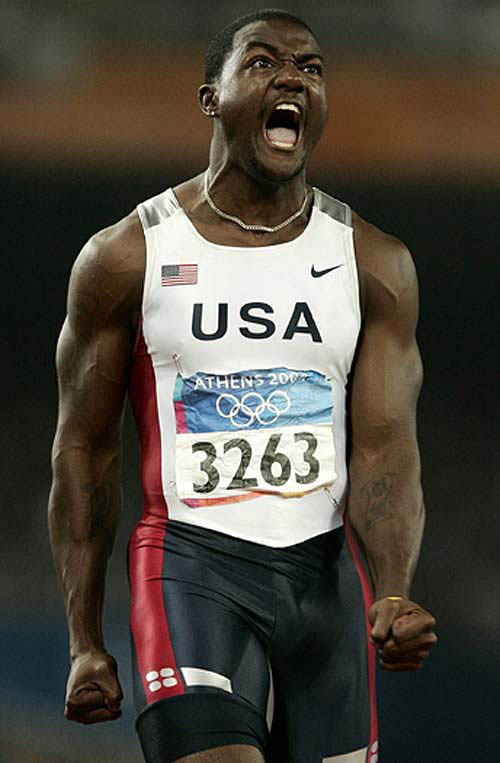
Disgraced United States champion sprinter Justin Gatlin was given a temporary restraining order on his four-year ban from the sport this week, meaning he may have a chance to defend his gold medal in Beijing. While it’s no guarantee he will make it to China, the idea of reinstating an athlete convicted of steroid use is a tough pill to swallow. But why? Is there no such thing a second chance in sports?
In prisons, inmates take part in various rehabilitation programs. They learn positive habits, earn a high school diploma, and even learn the art of yoga. If ruthless killers can master the ways of regulating their inner chi, why is it that disgraced athletes cannot be rehabbed to return to sport?
In this steroid era that seems to be plaguing the world of track and field, we are quick to shun athletes that are mentioned in the countless steroid allegations raised every week. Surely, an allegation means guilt, we tell ourselves. We’ve heard all the excuses, the ‘I’ve never knowingly taken anything’ and the ‘I didn’t know that was banned’ and even the ‘It must have been something in my toothpaste’.
So when it came to light that Gatlin had tested positive for steroids for the second time in 2006, it was time to write him off, right? Surely this man is a cheater. All it takes is one look at him and it’s obvious he must use steroids – he looks like he should be playing rugby, not running track. And this, being his second offence? Surely he must be a cheat! Off with his head!
But then it comes to light that his first offence was likely a mistake. Gatlin is one of tens of millions that suffer from Attention Deficit Disorder (ADD). His medication contained amphetamines that led to him testing positive at a junior meet in 2001. He was suspended for two years, but reinstated after one. But because his medication contained a banned substance, this suspension should have never been enforced in the first place. In the U.S., Gatlin’s right to take medication is protected under the Americans with Disabilities Act – he cannot be punished for taking necessary medication.
So his suspension was reduced, and he was told a second violation would lead to a lifetime ban from the sport. This means Gatlin was under extremely watchful eyes. In the 2004 Sydney Olympics, he won the 100m and placed third in the 200m. In 2005, he won the 100m and 200m at the World Championships. He was clean, on top of the world, and without any reliance on banned substances. Then, one year later, he tested positive a banned substance, and was consequently written off by the track and field community.
But this clearly isn’t an open-and-shut case. Why would Gatlin be tempted to use banned substances when he knew one more violation would result in a lifetime ban? He was already under a very watchful eye. Surely he could not be so daft as to mettle with steroids when he was already one of the best in the world. But Gatlin is not the brightest tool in the shed. One of the first things he should have done was fire his coach, Trevor Graham. Eight of Graham’s athletes have tested positive for performance enhancing drugs. And it was Graham who famously told the press about Gatlin’s second positive test, ‘I know it was sabotage. I don’t think it was sabotage at all. I know it is.’ Graham laid blame on a mysterious cream that a therapist rubbed on Gatlin’s legs before the meet.
Facing a lifetime ban but citing the first offence as minor, the International Association of Athletics Federations banned him for eight years. They later reduced it to four. Gatlin was denied to have it reduced to two years this May, but now a judge has given him a break – his first break in two years.
I am in no way condoning cheating. Marion Jones? Lock her up. NBA referee Tim Donaghy, who admitted to fixing games to win bets? Lock him up and throw away the key. But Gatlin is different. His first suspension should never have occurred. This means his second positive test should have ended in a two-year suspension, not an eight-year ban. If he were given a two-year suspension, he would have been eligible to compete in next week’s U.S. Olympic trials. And while Graham’s allegations of sabotage seem outrages, Gatlin would be the last person to use banned substances considering he knew he was under a microscope.
So next week, Gatlin may be running at the U.S. trials. After a two-year fight to get back to the track, Gatlin has been given a chance. And don’t think that the U.S. is just going this is a ploy to win more medals – the American team already has Tyson Gay, who won three golds at the World Championships, and Gatlin has more critics than supporters.
But next week, he will have a chance. And why not? If prisoners can be rehabilitated to a return to the real world, why can’t athletes be rehabbed to return to the sports world? We must ask ourselves which is worse – a convicted killer being released after serving 25 years, or a convicted sprinter being allowed to return after two years? If cheating is frowned upon more than murder, what's to stop me from bringing a pistol to my next rugby game?
No comments:
Post a Comment